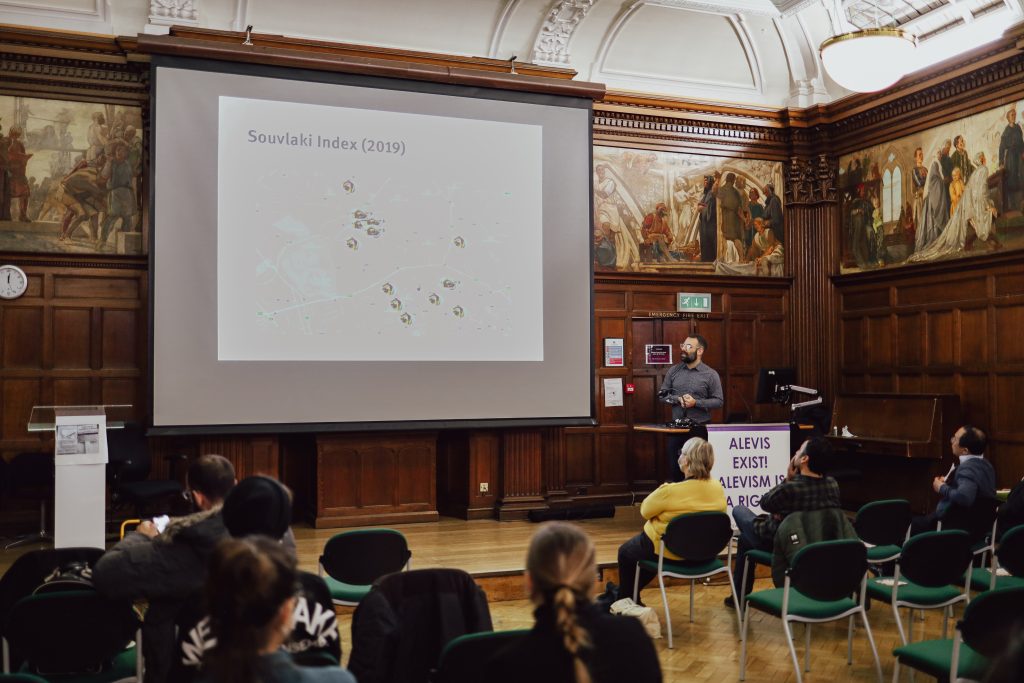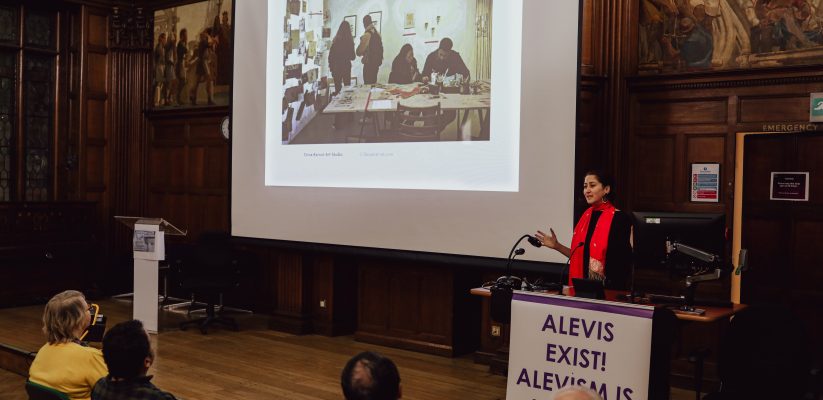Authors: Dr Cangbai Wang and Temitope Olufiranye
On Wednesday 16 March 2022, Fyvie Hall played host to a team of erudite speakers associated with HOMELandS (Hub on Migration, Exile, Languages and Spaces) who shared their cutting-edge research and art practice with the audience and engaged on a conversation on how migration communities make place and construct multicultural identities in global London.
This well attended event, which is part of the World in Westminster Festival, was chaired by Dr Cangbai Wang to showcase the innovative research carried out by HOMELandS that focused distinctly on the intersection between mobilities, languages and spaces in a global context. Professor Terry Lamb gave the opening remark and sighted amongst others the importance of migration research as a useful lens to celebrate cultural and ethnic diversity in the university.
Celia Jenkins and Umit Cetin made the first presentation, titled “Alevi Kurds in the UK: paving the way towards recognition of a new ethnoreligious identity”. Since 2010, they have been working with the Alevi community around identity issues and are at the forefront of promoting Alevi Studies in the UK. The majority of Alevis in the UK are Kurdish and constitute one of the largest diasporic Alevi Kurdish communities in the world. In the presentation, they traced the migration of Alevi Kurdish from Turkey to the UK, discussed the challenges faced by Alevi Kurdish, especially the disaffection of second generation, and investigated the ways in which they have constructed a distinctive ethno-religious Alevi identity in the UK by negotiating and redefining the boundaries of their ethnic, socio-political, cultural and religious identity. The research and social campaign conducted by Celia and Umit have contributed directly to the official recognition of Alevism as religious identity in the 2021 UK census, a big step forward in the participation of Alevi Kurds into mainstream British society.
Petros Karatsareas drew our attention to the Greek-speaking migrants in London with a special focus on the relations between food, language and identity. In his presentation, titled “A new kind of pitta bread in town: food, language, and identity among Greek-speaking migrants in post-2010 London”, Petros introduced the fast-changing cultural landscape of the Greek-speaking communities in London, and how this demographic change is reflected in the diversifying geography of food and foodways. He also shared with the audience his new research project funded by Research England that is aimed at exploring how different groups of post-2010 migrants from Greece and Italy employ sensory resources to construct cultural identities, as well as how migrants respond to the challenges created by Brexit and the COVID-19 pandemic. The ideas of looking into how migrants create and contest identities in everyday “food talk” taking place in Greek and Italian foodscapes, and how the identification processes are shaped by wider social conditions that define migration trajectories and the context of present-day London are fascinating.

While the first two presentations were delivered by academics at University of Westminster, the third talk, titled “Art and migration”, was given by artist Dima Karout, who is Curator and Creative Director with over 15 years’ experience in curating exhibitions, managing art projects and designing adults’ learning programmes. She shared with the audience two of her recent art projects. One was “Library of Humanity”, a participatory art installation working with the British Museum on the subjects of travel, city and belonging, and the other was “Room to Breathe/Borderless”, a residency programme + Exhibition for The Migration Museum. She is currently artist in residence at Lewisham Council working on a project called “We are Lewisham” that seeks to create a space of borough-wide community conversations about diversity, belonging and identities. Her talk convinced the audience the power of art for understanding transnational mobility and bringing about positive changes to society.
Urban space is one of the key topics alongside religion, language, food and art practice in the research of migration, and London’s Chinatown has offered a good example of how migrants interact with each other and with the local society to create a new space in a global city. This was the topic of the fourth presentation delivered by Xiao Ma, a doctoral researcher at the School of Humanities, University of Westminster. In her talk, titled “London’s Chinatown: the making of a multicultural space in a global city”, she presents preliminary findings of a study of London Chinatown food heritage trail as part of her doctorial project. By drawing on Henri Lefebvre’s “triad of space production” and through reading into rich ethnographic data including interview transcript and images, she explores critically the issue of place, authenticity and ownership of heritage and the contested notion of migrant community through the lens of food heritage. Her research challenges the essentialist understanding of London’s Chinatown, opening up spaces of reimagined “Chinatown” through heritage-making.
The four extremely rich and engaging presentations by speakers from diverse backgrounds offered a fine snapshot of the wide-ranging and impactful research of migration and diaspora at University of Westminster. We cannot wait to have the next HOMELandS Dialogue event where people share with each other the most recent research and public engagement activities and celebrate diversity that is in the heart of Westminster.
If you want to stay updated with the latest news and events, make sure you follow HOMELands via their social media channels:
Twitter: https://twitter.com/wmin_HOMELandS
Facebook: https://www.facebook.com/wminHOMELandS
Instagram: https://www.instagram.com/wmin_homelands/
Authors’ biography:
Dr Cangbai Wang is Reader in Chinese Studies and co-leader of HOMELandS. He specialises in the research of transnational Chinese migration and migration-related cultural heritage studies. He has published widely in peer-reviewed international journals including Asian Population Studies, Journal of International Migration and Integration, Asia Pacific Viewpoint, International Journal of Heritage Studies, China Information and Modern China. His most recent book is Museum Representations of Chinese Diasporas: Migration Histories and the Cultural Heritage of the Homeland (Routledge 2020).
Temitope Olufiranye is an experienced business development and social media management professional. He is currently studying MSc in Business Intelligence and Analytics at the University of Westminster. As the social media officer for HOMELandS, he works with the team in creating digital content to promote HOMELandS’ activities and increase its online visibility.
